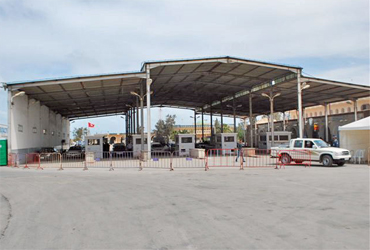By Libya Herald staff.

Tripoli/Tunis, 9 February 2016:
The Tripoli-based administration led by Khalifa Ghwell has threatened to shut the border with Tunisia . . .[restrict]if the Tunisian authorities do not reopen Tunis airport to Libyan carriers.
Speaking at a press conference in Tripoli today, Tripoli’s “foreign minister”, Ali Abuzakuk, said that it would take action on the basis of what he claimed was “reciprocity”.
Tunisia ordered all Libyan airlines to stop using Tunis-Carthage Airport at the beginning of December supposedly as a security measure following the 24 November suicide bombing in the Tunisian capital. It was intended to be for one month but was then extended. Three days ago, the ban was relaxed, but Tunis-Carthage is still off-limits to Libyan carriers.
Responding to comments from top Tunisian political figures in recent days about the threat of terrorism spreading from Libya to Tunisia, Abuzakuk was sharply critical, saying that terrorists in Tunisia was Tunisians but, likewise, terrorists in Libya were also Tunisians. Tunisia, he claimed, had not demonstrated than any one terrorist in the country was Libyan.
He also accused Tunisia of breaching the Arab Maghreb Union Convention and destabilising Libya by allowing meetings to take place in the country which were aimed at replacing the Ghwell “government” with an alternative.
He was referring to the fact that, until a few days ago, Tunis has been the home of the UN-recognised Presidency Council which has been trying to chose a national unity government.
(He seemed unaware that it was also where, at the beginning of December, the General National Congress and some members from the House of Representatives announced their own plans for a national unity government which would replace both the Beida and Tripoli administrations.)
Further speaking of reciprocity, Abuzakuk also appeared to threaten that Turks and Jordanians will in future be required to have visas to travel to Libya (or at least to Tripoli). He said that that Libya would impose visas on the citizens of countries that had imposed them on Libyans.
Turkey introduced visas for Libyans in September. Jordan did so in December.
Meanwhile, continuing the anti-Tunisian tone of the press conference, the Tripoli “health minister”, Taher Al-Senussi, declared that Libya would stop allowing Libyans going to Tunisia for medical treatment unless the Tunisians changed their behaviour towards them. The threat, he said, covered both those paid for by the state and those going privately.
Despite the tough talk, it is not clear if the Tripoli regime could close the border or stop Libyans going to Tunisia whether for medical or any other reasons.
The Ras Jedir crossing is controlled by guards from Zuwara who will take their orders from their own military leaders who are likely to act in the town’s and their own interests. The southern Wazen-Dahiba crossing is controlled by militiamen from Nalut who again act in their own interests but are seen as moving towards supporting the Presidency Council and the planned national unity government.
Zintan has its own, unofficial, border crossing at Mashhad Salih.
In any event, closing the border would hit Libyans harder rather than Tunisians. Most of those crossing into Tunisia are Libyans, either on business, for a short break, for medical reasons – or, increasingly, escaping the chaos and dangers at home.
As for the Tunisian authorities, it is unlikely that any threat to close the border would unduly worry them at present, given the increasingly heated public talk in the country about the possibility of vast numbers of Libyans entering in the if there is foreign military intervention in Libya. [/restrict]






